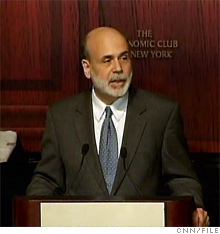Fed rage boils over on Capitol Hill
Fed chief Ben Bernanke is expected to win confirmation to a second term. But it won't be pretty. The push in Congress to rein in the central bank is gaining steam.
 |
| Chairman Bernanke's confirmation hearings start Thursday. |
WASHINGTON (CNNMoney.com) -- Federal Reserve Chairman Ben Bernanke has a tough road ahead.
Very tough.
Bernanke, whose four-year term expires in January, is certain to face a contentious Senate banking panel at his confirmation hearing on Thursday. He is also defending against the sharpest attack on Federal Reserve powers ever.
In an opinion piece to be published in Sunday's Washington Post, Bernanke blasted two moves to limit the Fed - a House measure to dig into the central bank's books and a Senate bill that would strip the Fed of its regulatory power.
Fed watchers say they expect that Bernanke will be confirmed for a second term as chairman. But he may get the fewest favorable votes on record - and end up at the helm of a vastly changed Federal Reserve.
"It's going to wind up to be a very different institution," said American Enterprise Institute scholar Vincent Reinhart, a former director of the Fed's division of monetary affairs. "At least on the Federal Reserve part, Congress is going to converge on something that's tougher on the Fed. It's a way to vent anger. And fundamentally people are angry."
While many credit Bernanke for saving the economy from falling into the next Great Depression, some in Congress blame the Fed - and Bernanke - for having failed to restrain the housing bubble. Others say he has gone too far in the financial system bailouts.
"We're in a very populist era and that populism is manifesting itself in a dislike and distrust in large institutions," said Washington policy analyst Brian Gardner of investment firm Keefe Bruyette & Woods. "That means the Fed is one of those targets."
But the proposal to allow for congressional audits of the Fed is taking that anger one step further.
Since the 1980s, Fed antagonist Rep. Ron Paul, R-Texas, whose recently published book is entitled "End the Fed," has been trying to pass bills to curb Fed powers.
Paul has won approval for his audit proposal from a key House committee.
"I agreed with him that some increase in openness about the Fed was important," Rep. Barney Frank, D-Mass., chairman of the Financial Services Committee, told CNNMoney.
The audit measure scares the Fed and many of its defenders.
Bernanke says that Paul's proposal, which would allow members of Congress to have the Government Accountability Office audit Fed activities, would interfere with the central bank's ability to carry out independent monetary policy.
Rep. Mel Watt, D-N.C., who offered an alternative version of the audit proposal that did not go as far, recently pleaded with his colleagues to moderate their anger.
"I recognize the Fed currently has no political capital. Everyone would like to beat up on the Fed and call them the bad guys," Watt said. "If we make this decision on a political basis, I know what the result will be."
Politics won out. With the votes of 15 Democrats and all Republicans, the panel passed Paul's more controversial audit.
Still, the measure may meet resistance in the Senate. Sen. Judd Gregg, R-N.H., said in a statement that it was "a dangerous move ... to pander to the populist anger" at the Fed.
"Make no mistake; this move to bring the Fed's conduct of monetary policy under the control of Congress is a grave threat to our economy," Gregg said.
Bernanke, 55, was first appointed to the top job in 2006 by former President George W. Bush, after serving as head of the Council of Economic Advisers.
Considered an expert on the Great Depression, Bernanke previously chaired the economics department at Princeton University. He also did a three-year stint on the Fed's board of governors ending in 2005.
Congress and the Fed have always had a complicated relationship. The Fed is designed to be independent and non-political, although it regularly reports to Congress.
The financial crisis and its aftermath have made things awkward for Bernanke on Capitol Hill. Congress didn't like that the Fed initially refused lawmakers' requests to reveal which major financial firms received billions in bailout dollars through the rescue of AIG (AIG, Fortune 500). The Fed later released the information.
Earlier this spring, when public rage boiled over about bonuses paid to the same unit of AIG responsible for the company's demise, lawmakers were irked to discover that the Fed had known for months about the bonuses.
For the past several months, a House oversight panel has been investigating whether the Fed, among other regulatory agencies, overstepped its authority in negotiating the Bank of America (BAC, Fortune 500) take over of Merrill Lynch.
Lawmakers have also accused the Fed of moving slowly on consumer protection. The Fed has lately stepped up in this area, crafting rules that crack down on credit card issuers and on banks' practice of automatically enrolling customers in overdraft protection programs with hefty fees.
Meanwhile, behind the scenes, Bernanke continues to make efforts to be more accessible than past Fed chairmen, according to lawmakers and congressional aides. He regularly answers questions, by phone or in person, aides say.
While Fed watchers expect Bernanke to be confirmed, they also expect that the hearing could turn into one of the more politically explosive confirmations the Obama administration has faced.
"Voting against him is a way of showing your discomfort with the current system and a lot of them are uncomfortable with the current system," Reinhart said. ![]()

